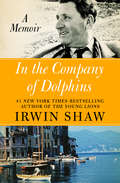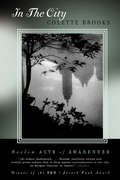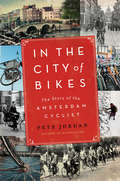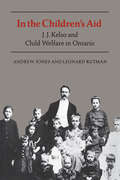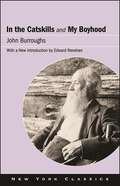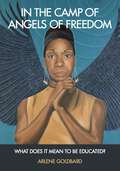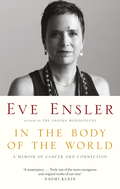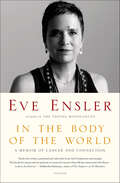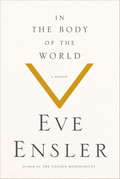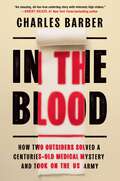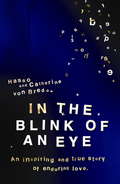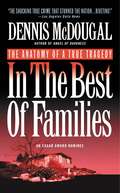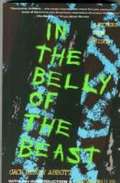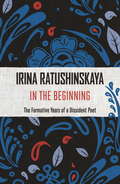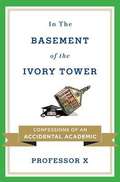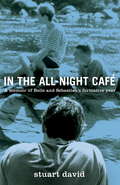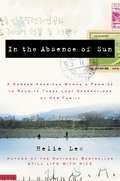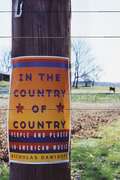- Table View
- List View
In the Company of Dolphins: A Memoir
by Irwin ShawBestselling author Irwin Shaw&’s lighthearted travelogue follows his family&’s vacation sailing from St. Tropez to Venice in the 1960s. As a boy, Irwin Shaw stared out across Brooklyn&’s Sheepshead Bay and dreamed of owning a boat and sailing the oceans wide. Decades later, he determined that chartering a yacht was better than having no boat at all. With his wife and son, Shaw then set out to mosey about the Mediterranean, guided by a Scottish captain, his wife and daughter, and a Greek cabin boy. From St. Tropez to Naples, and across the Adriatic to Dubrovnik and up to Venice, it was the trip of a lifetime, its only fault being that, eventually, it would have to end. Written in 1964, this travel memoir is a portrait of a bygone age, when the sun-soaked Mediterranean was still emerging from the shadow of World War II and &“vacation&” truly meant detaching oneself from the world. Featuring cameos by legendary authors such as Françoise Sagan and James Jones, this endearing memoir is the next best thing to a Mediterranean cruise.
In the City: Random Acts of Awareness
by Colette BrooksAn award-winning kaleidoscope of a book that "shocks and stirs the urban heart," capturing city life on the edge of the twenty-first century. What kind of person is a city person? This is a question of increasing importance, Colette Brooks suggests, as the city begins to spread, inexorably, into the furthest reaches of the modern mind. One possibility: a city person is someone "who doesn't feel the need to finish a jigsaw puzzle, who relishes jagged edges and orphaned curves, stray bits of data, stories parsed from sentences half overheard on the streets." Someone who is willing, sometimes eager, to immerse herself in mystery. Winner of the PEN/Jerard Fund Award, In the City is an idiosyncratic, lyrical, edgy exploration of the urban experience. This daring, unpredictable work breathes new life into the nonfiction form. Chronicling the often haphazard lives of city dwellers and cities themselves, In the City is a window into the urban psyche. An unnamed narrator roams the streets of an unnamed city, practicing "random acts of awareness" as she gathers disjointed pieces of the puzzle. She is sometimes in a city that seems to be New York, and sometimes in cities halfway around the world. In her wanderings she collects bits of stories, some taken from the headlines, some from the streets, some from the distant past. She studies criminals, innocent bystanders, commuters; a renowned painter who fled to the country; a bomber who sends unsuspecting city dwellers lethal packages marked "personal"; a blind, deaf woman who loves to ride the subway; a young cabdriver who keeps an open dictionary at his side as he drives, struggling to learn a strange language; a perplexed explorer who finds himself, against all expectation, stranded at the very edge of the earth. All of these people, she discovers, are city people, whether they know it yet or not. Some will flourish, others will be lost, victims of chance and mischance: the woman who drinks by herself in a brownstone apartment; the ancient city dwellers who couldn't outrun fire or flood; the children whose faces end up on posters on a wall. Those who survive learn, sooner or later, that everyone keeps company with ghosts who walk alongside. In the City shows us that the city is a place where past and present are commingled, where questions rarely have answers, where danger, difficulty, and exhilaration are interwoven in ways we can hardly begin to explain. Welcome to the city, the place where all contrary indications hold true.
In the City of Bikes
by Pete JordanWhen Pete Jordan arrives in Amsterdam to study how to make America's cities more bicycle-friendly, he immediately falls in love with the city that already lives life on two wheels. His new bride, Amy Joy, joins Pete, and despite their financial hardships and instability, she eventually finds her own new calling as a bicycle mechanic as Pete discovers the untold history of cycling in Amsterdam. From its beginnings as an elitis t pastime in the 1890s to the street-consuming craze of the 1920s, from the bicycle's role in a citywide resistance to the Nazi occupation to the White Bikes of the 1960s and the bike fishermen of today, Jordan chronicles the evolution of Amsterdam's cycling. Part personal memoir, part history of cycling, part fascinating street-level tour of Amsterdam, In the City of Bikes is the story of a man who loves bikes—in a city that loves bikes.
In the Children's Aid: J.J. Kelso and Child Welfare in Ontario
by Leonard Rutman Andrew JonesThe present system of child welfare in Canada dates from 1893, the year in which the Ontario Legislature passed 'An Act for the Prevention of Cruelty to, and better Protection of, Children.' The Act provided for the establishment of Children's Aid Societies with extensive legal powers to intervene in cases of child neglect and cruelty, and gave officials sanction to the foster care system. These radical departures from earlier policy resulted from the actions of John Joseph Kelso, the man who was named as the first Superintendent of Neglected and Dependent Children – a position created by the same Act. At 29, Kelso was already one of Ontario's leading proponents of child welfare reform. He had earlier stimulated the formation of the Toronto Humane Society and subsequently guides its early growth. In 1888 he had formed the Children's Fresh Air Fund and the Santa Claus Fund, out of which, in 1891, he founded the Toronto Children's Aid Society. From 1893 to his retirement in 1934, Kelso directed and promoted the establishment and development of Children's Aid Societies in Ontario and played an important role in their spread to other provinces. In 1921 he was appointed administrator of Ontario's first Adoption Act and the Children of Unmarried Parents Act. His reform activities extended into the children's court movement, the closing of reformatories, organization of playgrounds, and advocacy of mothers' allowances. This biography provides an account of Kelso's life and career as a social reformer, and reveals him as the undisputed chief architect and builder of Ontario's welfare system. It will interest the academic and professionals as it traces the roots of social welfare services and the profession of social work, and the general reader interested in Canadian history and social reform.
In the Catskills and My Boyhood (Excelsior Editions)
by John BurroughsHenry James called John Burroughs (1837–1921) "a more humorous, more available, and more sociable Thoreau." Walt Whitman in turn extolled Burroughs as "a child of the woods, fields, hills—native to them in a rare sense (in a sense almost a miracle)." Throughout his many books and essays, Burroughs was never more eloquent on nature themes than when writing about his native countryside: the woods, streams, and mountains of the Catskills in New York. In the Catskills collects the very best of Burroughs's writings about his birthplace in a book that is sure to be treasured by all lovers of the region as well as lovers of the literature of nature. This new edition includes an introduction by Burroughs biographer Edward Renehan and an additional work not included in previous editions, entitled My Boyhood.
In the Camp of Angels of Freedom: What Does It Mean to Be Educated?
by Arlene GoldbardAn autodidact explores issues of education itself through essays and personal portraits of the key minds who influenced herWhat does it mean to be educated? Through her evocative paintings and narrative, author Arlene Goldbard has portrayed eleven people whose work most influenced her—what she calls a camp of angels. She sees each as a brave messenger of love and freedom for a society that badly needs “uncolonized minds.” Goldbard describes how the learning from each changed the course of her life in essays that offer generative moments of a life in art and social change. She also reveals ways a dominant society tried to put a first-generation American from a socially marginal family in her place—and failed. Readers will learn about the author’s own self education, issues of formal higher education and its discontents, and the damage done by a society that prizes profits over people. Goldbard asks readers to consider the impact of credentialism on U.S. society and what we can do to set it right.
In the Body of the World: A Memoir of Cancer and Connection
by Eve EnslerI have been exiled from my body. I was ejected at a very young age and I got lost.Playwright, author and activist Eve Ensler has devoted her life to the female body - how to talk about it, how to protect and value it. Yet she spent many years disassociated from her own - a disconnection brought on by her father's sexual abuse and her mother's remoteness.While working in the Congo, Ensler is shattered to encounter the horrific rape and violence inflicted on the women there. Soon after, she is diagnosed with uterine cancer, and through months of treatment she is forced to become first and foremost a body - pricked, punctured, cut, scanned. It is then that all distance is erased. As she connects her own illness to the devastation of the earth, her life force to the resilience of humanity, she is finally, fully - and gratefully - joined to the body of the world.
In the Body of the World: A Memoir of Cancer and Connection
by Eve EnslerThe bestselling author of The Vagina Monologues shares her “extraordinarily riveting, graphic story of survival” (Publishers Weekly).In this extraordinary and evocative memoir, playwright, author, and activist V, formerly Eve Ensler, traces many paths of reconnection: with her body, after she is diagnosed with cancer; with the people of the world, in the face of injustice and abuse; and with the earth, victim of mass exploitation.Working in the Congo, V meets survivors of horrific rape and violence and sees firsthand how these women are creating hope and possibility out of horror. Just as she is about to help open a revolutionary leadership center called City of Joy, she is diagnosed with uterine cancer, resulting in months of difficult treatment. Through her experience, V is forced to become first and foremost a body—pricked, punctured, cut, scanned. As she recovers from her illness, V is able to let go of everything that doesn’t matter and find strength in what does.In the Body of the World is a haunting, revelatory work that calls on us to reestablish our connection to our bodies, to the world, and to those around us.Praise for In the Body of the World“Warm, funny, furious, and astute, as well as poetic, passionate, and heroic, Ensler harnesses all that she lost and learned to articulate a galvanizing vision of the essence of life: ‘The only salvation is kindness.’ . . . [A] scorching and enlightening memoir.” —Booklist (starred review)“A necessary book to read for its fierce, passionate commitment to making the world a safe place for women.” —The Boston Globe
In the Body of the World
by Eve EnslerFrom the bestselling author of The Vagina Monologues and one of Newsweek's 150 Women Who Changed the World, a visionary memoir of separation and connection--to the body, the self and the world. Playwright, author, and activist Eve Ensler has devoted her life to the female body--how to talk about it, how to protect and value it. Yet she has spent much of her life disassociated from her own body--a disconnection brought on by her father's sexual abuse and her mother's remoteness. "Because I did not, could not inhabit the body or the Earth," she writes, "I could not feel or know their pain." But Ensler is shocked out of her distance. While working in the Congo, she is shattered to encounter the horrific rape and violence inflicted on the women. Soon after, she is diagnosed with uterine cancer, and though months of harrowing treatment, she is forced to become first and foremost a body--pricked, punctured, cut, scanned. It is then that all distance is erased. AS she connects her own illness to the devastation of the earth, her life force to the resilience of humanity, she is finally, fully--and gratefully--joined to the body of the world.From the Trade Paperback edition.
In the Blood: How Two Outsiders Solved a Centuries-Old Medical Mystery and Took On the US Army
by Charles BarberThe "high-stakes" true story of how an absent-minded inventor and a down-on-his-luck salesman joined forces to create a once‑in‑a‑generation lifesaving product: "Suspenseful storytelling helps us see and feel the struggle and frustration, the sweat and tears . . . Inspiring&” (Robert Kolker, #1 New York Times bestselling author of Hidden Valley Road). At the 1993 Battle of Mogadishu, dramatized by the popular film Black Hawk Down, the majority of soldiers who died were killed instantly or bled to death before they could reach an operating table. This tragedy reinforced the need for a revolutionary treatment that could transform trauma medicine. So, when Frank Hursey and Bart Gullong—who had no medical or military experience—discovered that a cheap, crushed rock called zeolite had blood‑clotting properties, they brought it to the military's attention. The Marines and the Navy adopted the resulting product, QuikClot, immediately. The Army, however, resisted. It had two products of its own being developed to prevent excessive bleeds, one of which had already cost tens of millions of dollars. The other, "Factor Seven," had a more dangerous complication: its side effects could be deadly. Unwilling to let its efforts end in failure—and led by the highly influential surgeon Colonel John Holcomb—the Army set out to smear QuikClot&’s reputation. Over the course of six years, Hursey and Gullong engaged in an epic struggle with Holcomb for recognition. Ultimately, a whistle‑blower inside the Army challenged the Army&’s embrace of Factor Seven, which resulted in a massive lawsuit led by the U.S. Department of Justice. The lawsuit focused further attention on the financial ties between the pharmaceutical company that produced Factor Seven and Holcomb&’s research institute. By withholding QuikClot—which later became the medical miracle of the Iraq War—and in the use of Factor Seven with its known, life-threatening risks of heart attacks and strokes, the lives of countless soldiers were imperiled. Using deep reportage and riveting prose, In the Blood recounts this little‑known David‑and‑Goliath story of corruption, greed, and power within the military—and the devastating consequences of unchecked institutional arrogance.
In the Blink of an Eye: Dale, Daytona, and the Day that Changed Everything
by Ellis Henican Michael WaltripThere was one lap to go in the 2001 Daytona 500, NASCAR's most celebrated event. Michael Waltrip and Dale Earnhardt Jr. were running one-two. Junior's legendary dad, the driver race fans called "The Intimidator," was close behind in third, blocking anyone who might try to pass. Waltrip couldn't stop thinking about all the times he'd struggled to stay ahead--and the 462 NASCAR Cup races he'd lost without a single win. He'd been a race-car driver all his adult life, following in the footsteps of his brother Darrell, a three-time NASCAR champion. And his losing streak was getting more painful every race. But this day, he knew, could be different. He was driving for Dale Earnhardt now, racing as a team with his close friend and mentor. Yet as his car roared toward the finish line, ending that losing streak once and for all, Waltrip had no clue that the greatest triumph of his life could get mired in terrible tragedy. This is the story of that fateful afternoon in Daytona, a day whose echoes are still heard today. But the story begins years earlier in a small town in Kentucky, with a boy who dreamed of racing cars, a boy who was determined to go from go-karts to the highest levels of NASCAR. For the first time ever, Michael Waltrip tells the full, revealing story of how he got to Daytona, what happened there, and the huge impact it had on so many in the racing world. He reveals for the first time how his own life changed as he dealt with guilt, faced his grief, and searched for the fortitude to climb into a race car again. It's an inspiring and powerful story, told with Michael's trademark humor, honesty, and irreverence. It's a story of family, fulfillment, and redemption--and well-earned victory in the end.
In the Blink of an Eye: Dale, Daytona, and the Day That Changed Everything
by Ellis Henican Michael WaltripThe book details the history of "the younger brother of Darrell" and his beginnings in the sport, way back in 1981, that led to an illustrious driving career that has included being one of only eight drivers to have won the revered Daytona 500 more than once, and one of only three drivers in NASCAR history to make more than one thousand starts. In this piece of well written NASCAR literature, Waltrip and co-author, Ellis Henican go on to tell about some of the negative circumstances and situations the racer, turned team owner, turned television personality, has been involved in, and his perils on and off the track. From literally hitting people (Dave Marcis, Lake Speed) to deliberately hitting cars (Jeff Green, Robby Gordon, Casey Mears, and Clint Bowyer) to having his team accused of using illegal engine additives that led to steep fines and the disqualifications of his crew chief and Director of Competition, as well as a 100 point dock in driver points, that led to Waltrip being the first driver in the sport's history to enter a second race of a season with negative points, Michael Waltrip tells it like it was and is with not much to hide for fans and readers. Includes photo captions in the last pages.
In the Blink of an Eye: An Inspiring And True Story Of Enduring Love
by Hasso and von BredowThe heartbreaking true story of a love that transcended tragedy.On 1 May 2000 Hasso von Bredow's life was forever changed. The young and active father of three suffered a massive stroke at the base of his brainstem, leaving him totally paralysed and unable to speak. With his mind as cognitive and as active as it had always been, his body became his painful prison.IN THE BLINK OF AN EYE is Hasso's moving and life-affirming memoir. At 42 Hasso had to come to terms with a life 'locked in', being dependent on others for every breath, but worst of all, losing his most precious of possessions: his voice.The only way Hasso could communicate with the world was by blinking his eyes. And using coded blinking and state of the art technology, he wrote this incredibly moving memoir letter by letter, helped only by his wife and carer, Catherine.
In the Best of Families: The Anatomy of a True Tragedy
by Dennis McDougalRonald Reagan's personal attorney Roy Miller was a California success story. The Miller family's friends could never have imagined the horror and darkness that were to follow as Michael, the Miller's youngest son killed and raped his own mother.
In the Belly of the Beast: Letters from Prison
by Jack Henry AbbottThe book is a 37-year-old man's account of 25 years behind bars.
In the Beginning
by Irina RatushinskayaIN THE BEGINNING goes back to the poet's life before her arrest, interweaving her experiences of growing up in Odessa with those of her childhood friend and future husband Igor Geraschenko. With wit and simplicity Irina describes a biased and turbulent education, being pressured to work for the KGB, the growth of faith that became so important to her in later life, and an impromptu wedding. Ratushinskaya shows how her early experiences moulded her personality, enabling her at a time of almost unbearable pressure to remain true to her own convictions.
In the Basement of the Ivory Tower
by Professor XThe controversial book that crystallized the current debate over the value and purpose of a college education When Professor X's article that inspired this book was published in the Atlantic Monthly, a firestorm of controversy began as teachers across the country weighed in, some thanking him for his honesty and others pillorying him for his warts-and-all portrayal of the downside of universal college enrollment. The article was chosen by David Brooks for a Sidney Award, given to the best magazine articles every year, and kicked off an anticollege backlash. Professor X is an adjunct professor of English literature and composition, a member of the poorly paid underclass who are now teaching the vast majority of our college courses. This is the story of what he learned on the front lines of America's academic crisis. .
In the Bag!: Margaret Knight Wraps It Up (Great Idea Series #3)
by Monica KullingTundra&’s Great Idea Series is comprised of biographies of inventors for early readers. The third book in the series introduces the fascinating Margaret Knight. Known as Mattie, she was different from most American girls living in 1850. She loved to make things with wood and made the best kites and sleds in town. Her father died when she was only three, and by the time she was twelve, she was working at the local cotton mill alongside her two older brothers. One day, she saw a worker get injured by a shuttle that had come loose from the giant loom, and the accident inspired her to invent a stop-motion device. It was the first of her many inventions.Margaret Knight devoted her life to inventing, and is best known for the clever, practical, paper bag. When she died in 1914, she had ninety inventions to her name and over twenty patents, astounding accomplishments for a woman of her day. Monica Kulling&’s easy-to-read text, peppered with lots of dialogue, brings an amazing, inspiring woman to life.
In the Backyard of Jesus
by Steven KhourySteven Khoury is an Arab pastor who ministers to the needs of Arabs and others in Israel. The book is his story, and his thoughts on how we can more effectively present the gospel to those around us. Of interest to those who pray for the persecuted church.
In the Arena: A Memoir of Love, War, and Politics
by Chuck RobbIn December 1967, Chuck Robb was catapulted onto the national scene when he married Lynda Bird Johnson, the daughter of President Lyndon B. Johnson, in a nationally broadcast White House wedding. Shortly thereafter, Robb, a U.S. Marine, deployed to Vietnam, where he commanded India Company of the 3rd Battalion, 7th Regiment, and was awarded the Bronze Star. These two experiences—seemingly polar opposites—illustrate much about the eventual Virginia governor and U.S. senator, who combined a commitment to family with an ingrained sense of civic duty on the national stage.In the Arena offers the first political memoir of the noted statesman’s extraordinary life, tracing his path from early days as an anonymous Marine to his fairytale wedding, from night movements in Vietnam to engaging in the height of Democratic politics in the Virginia state capitol and U.S. Senate, and from experiencing personal highs and lows to becoming a principled fighter and exemplar of today’s moderate Democrat. Despite representing a conservative state, he stood up for a woman’s right to choose, the Equal Rights Amendment, the constitutionality of flag burning, gay rights, and gun control. As governor, Robb raised the education budget by over $1 billion and appointed a record number of women and minorities to state positions, including the first African American to the Virginia Supreme Court. In 1996, in his second term in the Senate, he was the only southern senator to vote against the Defense of Marriage Act, the legislation banning gay marriage, calling the movement to end this discrimination a "fight for civil and human rights." Progressive on social issues, he was fiscally conservative and pro–national security, going on to co-chair the 2004 WMD Commission under George W. Bush. Looking back from our deeply partisan era, Robb’s independent approach now seems remarkable, as well as instructive. Full of honest reflections, In the Arena pulls back the curtain on one of America's proven political leaders and reveals the surprisingly colorful story of his career, marriage, and life.
In the All-Night Café
by Stuart DavidOne afternoon, in 1994, I had an idea. So begins Stuart David's magical, evocative memoir about Belle and Sebastian. Determined to make his living writing stories and songs, Stuart had spent several years scraping by on the dole in his small, industrial home town. Then he had the fateful idea to learn bass guitar, and to head for Glasgow in search of like-minded artists. It was a quiet but powerful idea that would completely transform his life. Within one extraordinary year he had helped create one of the most influential, beloved bands of all time. Set against a vivid background of early 90s Glasgow, In the All-Night Caf? describes Stuart's fortuitous meeting with the band's co-founder Stuart Murdoch on a course for unemployed musicians. It tells of their adventures in two early incarnations of Belle and Sebastian and culminates in the recording of the band's celebrated debut album, Tigermilk. A fascinating portrait of the group and its origins, it is also a story that will resonate with anyone who has put together - or thought of putting together - a band. It is a story of a group of friends who wanted to create a different kind of band and a different kind of music. And how - against all expectations - they succeeded. Written with wit, affection and a novelist's observant eye, In the All-Night Caf? brings to life the music and the early days of this most enigmatic and intriguing of bands.
In the Absence of Sun: A Korean American Woman’s Promise to Reunite Three Lost Generations of Her Family
by Helie LeeA breathtaking true story of a rescue mission undertaken by a young woman and her family in one of the most repressive countries in the world. Helie Lee often had heard her grandmother speak of an uncle, lost decades ago when he was a child during the family’s daring escape from North Korea. As an adult, he was still living there under horrid conditions. When her grandmother began to ail, Helie became determined to reunite her with her eldest son, despite tremendous odds. Helie’s mission became even more urgent when she realized that her first book, the bestselling novelStill Life with Rice, about the family’s escape, might have angered the North Korean government and put her uncle in danger. Pushing through rivers and forests, fighting the cold, bribing and manipulating border guards, gangsters, and secret service agents, Helie and her father finally achieve their goal. But there are many hurdles. Her uncle is forced to make a harrowing choice: leave his North Korean family behind or continue to live in oppression and starvation away from his beloved mother. And Helie has to face her deep, sometimes ambivalent, emotions about her identity in the family and as a Korean American woman. Unmarried and outspoken, she struggles in Korea, where women marry early and keep silent, and writes eloquently about the landscape there, both literal and cultural. She comes through a heartbreaking love affair only to face an intense and confusing relationship with the Guide—the man who, despite being crude and macho, ultimately helps to save her uncle and eventually his extended family through several daring acts of heroism. In the Absence of Sunis a riveting adventure story and a powerful tale of family bonds and reunion. “An eerie fear crawled through my flesh as I stood on the Chinese side of the Yalu River, gazing across the murky water into one of the most closed-off and isolated countries in the world. I couldn’t believe it. Even as my boots sank into the doughy mud, I had trouble coming to terms with the fact that I was actually standing there. . . . I was not prepared for the kind of despair and insane fear I felt that day. My wizened old uncle looked nothing like the sweet-faced teenager in the faded photograph that Halmoni kept pressed between the pages of her Bible. That day, at the Yalu River, staring helplessly into his terrorized face, I hadn’t fully realized what a dangerous thing I had done the year before. I had placed him and his family in danger. By including details of my uncle’s life in a book, I had alerted North Korea’s enigmatic leadership to the identity of my relatives in a nation where it was better to remain invisible. ” —FromIn the Absence of Sun From the Hardcover edition.
In the Country of Country: People and Places in American Music
by Nicholas DawidoffThis is the story of an American treasure that records and evokes the lives of people who often weren't written up in newspapers, but whose experiences of momentous events--the Depression, the Dustbowl, the Second World War--transformed their lives and would be the catalyst for an original American art form: country music. In the Country of Country is an exhilarating transcontinental journey from Maces Springs, Virginia, home of The Carter Family, to Bakersfield, California, where Buck Owens held sway and railway crossings where Doc Watson, Sara Carter, Bill Monroe, Ralph Stanley, and Jimmie Rodgers (The Father of Country Music) first learned to play their guitars, fiddles, and mandolins. Nicholas Dawidoff has traveled to the places where country music first emerged and talked to the musicians, writers, and singers who created this deceptively simple-worded, string- driven, melodic music. Here are indelible portraits of Johnny Cash, behind whose black apparel lies a Faustian dilemma between fame and creativity; Merle Haggard, a man as elusive as he is gifted; Patsy Cline, who would happily curl her girlfriends' hair as she curled their ears with her sailor's mouth; and Harlan Howard, the king of country songwriters. Inherent in Dawidoff's chronicle is a critique of contemporary country music--the pop/rock hybrid known as Hot Country that often stands in sharp contrast to the spirit of old- time country music. In the Country of Country is a book full of wonderful stories that together reveal an underappreciated piece of American culture. The picture captions and end material are present including the notes on Sources, Chapter notes of source interviews, articles and misc materials, bibliography, Discography, Index and credits.
In at the Deep End (Quick Reads)
by David DaviesAs he was carried off on a stretcher at the 2008 Olympics in Beijing, Welsh swimmer David Davies was celebrating his success. His exhausting performance in the first ever 10 km open water race earned him a silver medal and, more importantly, a place in British swimming history. But what was running though his head as he collapsed from the physical exhaustion of completing the Olympics' most gruelling swimming race?This is David's own story. The tale of how an ordinary schoolboy from Barry made the swimming world sit up and take notice. He talks about his determination and drive and his life both in and out of the water.
In at the Deep End (Quick Reads Ser.)
by David DaviesAs he was carried off on a stretcher at the 2008 Olympics in Beijing, Welsh swimmer David Davies was celebrating his success. His exhausting performance in the first ever 10 km open water race earned him a silver medal and, more importantly, a place in British swimming history. But what was running though his head as he collapsed from the physical exhaustion of completing the Olympics' most gruelling swimming race?This is David's own story. The tale of how an ordinary schoolboy from Barry made the swimming world sit up and take notice. He talks about his determination and drive and his life both in and out of the water.
